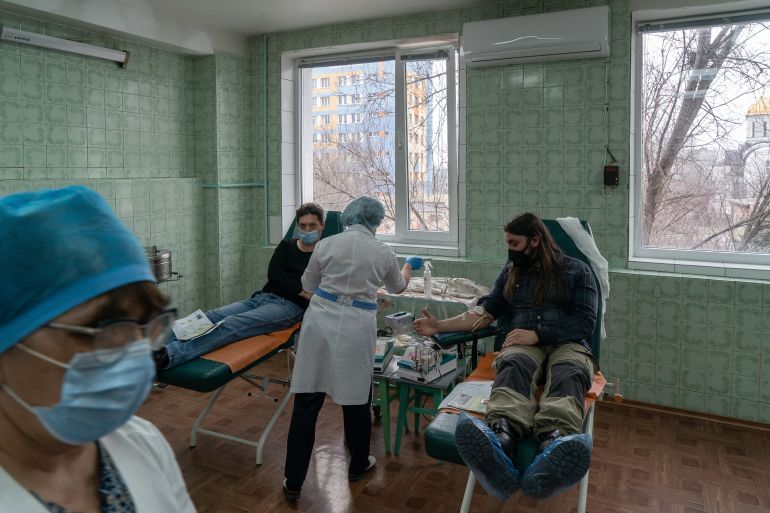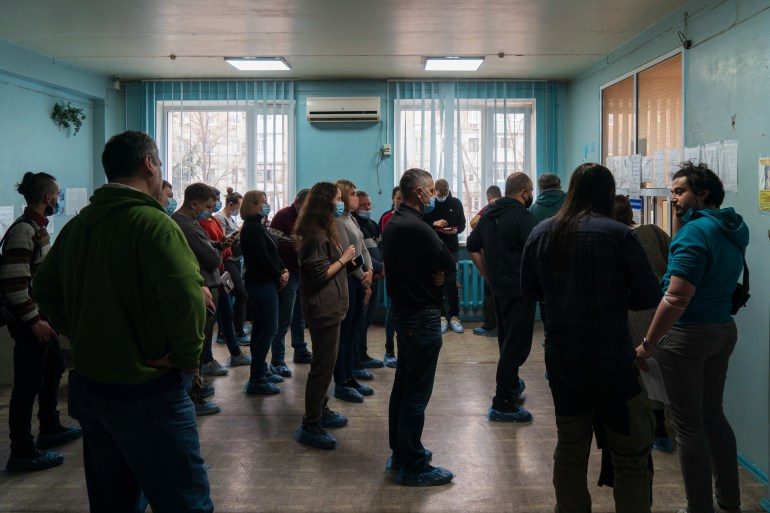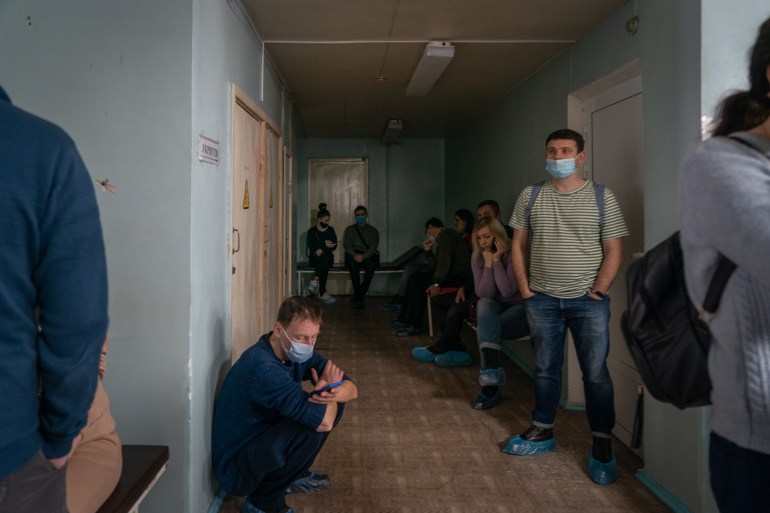‘Not going to leave’: Ukrainians in Mariupol await Russian attack
Throngs of Ukrainians have volunteered to give blood since Russia launched a full-scale invasion on the country.

Mariupol, Ukraine – The main hospital in Mariupol has been overwhelmed with civilians wanting to donate blood to help the wounded as Russian troops surround this city.
The hospital has the largest intensive care unit in the Donetsk region of eastern Ukraine; however, it only has a capacity for 200 donations a day. So many people have volunteered to give blood since Russia launched a full-scale invasion on the country on Thursday, that staff have had to turn many away.
Keep reading
list of 4 items‘Lethal assistance’: NATO steps up small-arms supply to Ukraine
Chechen leader, a Putin ally, says his forces deployed to Ukraine
Russia’s invasion of Ukraine: Key moments from day three
The hospital treats both military and civilian casualties with the most serious, life-threatening injuries, while donated blood also goes to the nearby military hospital, said Mavrov Volodymyr Georgiyovyc, director of the blood transfusion centre.
Despite a waiting time of several hours – and with fighting audible in the distance – adults of every age and gender queued to do their bit for people in need.
Nik, a 28-year-old who works in logistics, said he will never leave his city no matter what lies ahead and will do anything it takes to help his people.
“I don’t know how to hold a weapon but at least I can give my blood this way,” he told Al Jazeera.
“We are not fighting for land, money or fame, Ukraine is fighting for our people who are in trouble. If the international community don’t act today and provide the most protection they can, their country will be next.”

Russians closing in
On Friday, residents living east of Mariupol, 640km (398 miles) southeast of the capital Kyiv, reported heavy missile and artillery shell attacks that lasted for hours. They saw the impact on nearby buildings while their electricity and heating were cut.
As Russian troops began to close in on the city on Saturday, some tried to leave but trains were cancelled and by evening, some residents reported the roads out had been blocked.
The port city is highly vulnerable, in close proximity to the front line with pro-Moscow separatists, the Russian border, and the Sea of Azov, where Russian warships have been deployed. It is also strategically important for the economy, responsible for much of Ukraine’s exports.
Yet the city centre has so far seen little fighting, unlike the heavy bombardments seen in Kharkiv and Kyiv.
The United Kingdom’s defence ministry warned on Friday of an amphibious assault that had likely already happened between Mariupol and Melitopol, further west along the coast, although it is yet to be confirmed by other sources.
Unprecedented numbers
Hospital staff said they have never seen numbers like this arrive to donate blood, even in 2014 when a conflict with Russian-backed separatists broke out in eastern Ukraine.
However, the wounds they are seeing now are far worse, intensive care director Olha Golubchenko told Al Jazeera.
In 2014 and 2015, at the height of the previous conflict, the majority of the serious injuries the hospital dealt with were gunshot wounds. Now, staff are seeing much more severe damage caused by shrapnel tearing through flesh, which often causes heavy bleeding, as well as a lot of head wounds.

Golubchenko said it is the first time they have dealt with injuries of this kind.
The city was briefly under the control of separatists in 2014, and many here know all too well what occupation feels like as Russian troops draw nearer. However, many still believe in the might of the Ukrainian army and hope for outside intervention.
Oleg, 28, also donating blood on Saturday, said even though the next few hours, days, perhaps even months will be tough, he will find a way to help his people.
“If the Ukrainian flag goes down in Mariupol, I will move to somewhere safe and fight from there. But while the flag is up I am not going to leave,” he said.